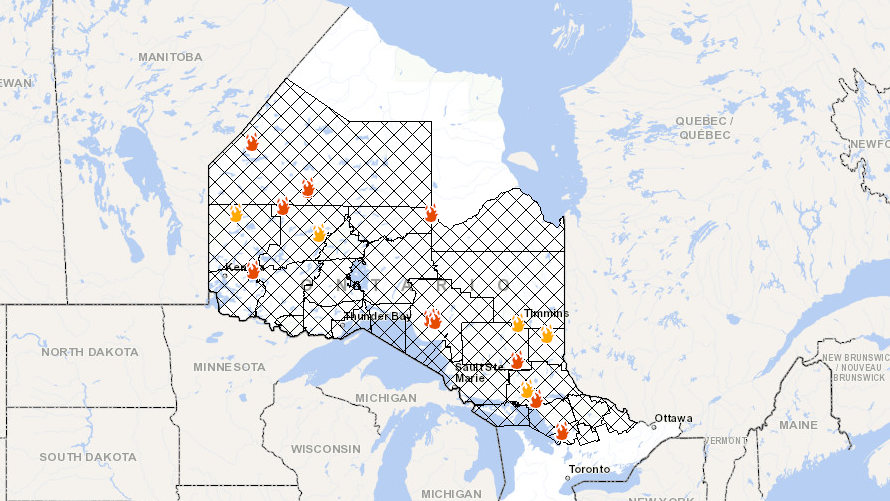Large part of Ontario now under provincial fire ban
A large part of Ontario is under a provincial fire ban due to high risk of forest fires.
As of June 1, most northeastern and northwestern regions of the province have been placed within a Restricted Fire Zone (RFZ), meaning that open fires and the burning of grass or debris are temporarily banned. The idea, officials say, is to prevent human-caused fires at a time in which dry conditions and little precipitation could help the flames spread.
“The chances of wildland fire starting, whether its nature caused or human caused, is much more likely to happen,” Amy Peltonen, a fire information officer with the Aviation Forest Fire and Emergency Services branch of the Ministry of Natural Resources, told CTV News Toronto.
- Download our app to get local alerts on your device
- Get the latest local updates right to your inbox
According to provincial data, there is an extreme danger of forest fires in central and northeastern Ontario, from just north of Sault Ste. Marie all the way to Belleville.
The risks are considered “high” in the Thunder Bay area before dropping to a “moderate” risk further west. A region near Thunder Bay and some of northern Ontario, the risks are considered “high” to “moderate.”
As of around 2 p.m., about a dozen new and active forest fires were reported.
“Right now, we are actually kind of on par for what we've seen compared to last year,” Peltonen said. “So we're not seeing necessarily a bad fire season at this point.
 An interactive map shows Ontario's Restricted Fire Zone as of June 1, 2023.
An interactive map shows Ontario's Restricted Fire Zone as of June 1, 2023.
Peltonen added that current and forecasted wildfires are being “continuously and carefully monitored.”
“Generally, Ontarians don't need to be concerned.”
So far this year, Ontario has reported 78 forest fires in total compared to the 77 fires reported within a similar time frame in 2022.
The provincial 10-year average is about 140 fires.
WHAT DOES BEING WITHIN A RESTRICTED FIRE ZONE MEAN?
Property owners living within these areas should try to keep their lawns mowed and watered, move wood piles and other flammable materials away from structures, and keep conifer trees pruned.
Propane gas or propane stoves may be used but officials warn they should be handled with extreme caution.
A large number of Ontario’s parks have reported fire bans, which means that campers cannot use fire pits, charcoal barbecues or candles.
A list of parks included in the ban can be found on the Ontario Parks website. It includes a number of large parks such as Algonquin, Arrowhead, and Killarney.
There are more than 200 wildfires burning across Canada, officials said Thursday. The government says that so far the blazes have torn through about 27,000 square kilometres of land compared to the 10-year average of 500 square kilometres.
Green Party Leader Mike Schreiner says that Ontarians should brace for a “severe fire season that will once again damage buildings, decimate communities and force many people to evacuate their homes.”
He called on the Doug Ford government to take action on climate change and provide funding for infrastructure while also stopping his plans to expand fossil gas plants.
“The hot weather is just getting started and already forest fires are raging across northern Ontario, while multiple communities sit under extreme fire warning,” he said in a statement.
“This is a matter of environmental injustice. Doug Ford needs to wake up and take action on the climate emergency.”
With files from the Canadian Press.
CTVNews.ca Top Stories

B.C. woman facing steep medical bills, uncertain future after Thailand crash
The family of a Victoria, B.C., woman who was seriously injured in an accident in Thailand is pleading for help as medical bills pile up.
LIVE @ 4 EDT Freeland to present 2024 federal budget, promising billions in new spending
Canadians will learn Tuesday the entirety of the federal Liberal government's new spending plans, and how they intend to pay for them, when Deputy Prime Minister and Finance Minister Chrystia Freeland tables the 2024 federal budget.
Ontario woman charged almost $7,000 for 20-minute taxi ride abroad
An Ontario woman was shocked to find she’d been charged nearly $7,000 after unknowingly using an unauthorized taxi company while on vacation in January.
WATCH Half of Canadians living paycheque-to-paycheque: Equifax
As Canadians deal with a crushing housing shortage, high rental prices and inflationary price pressures, now Equifax Canada is warning that Canadian consumers are increasingly under stress"from the surging cost of living.
Inmate who escaped from N.B. prison has long history of violent crimes
An inmate who escaped from Dorchester Penitentiary in Dorchester, N.B., on Saturday evening has a long history of violent crimes and a history of escaping custody.
Annual inflation rate increased to 2.9% in March
The annual inflation rate ticked higher in March compared with February, boosted by higher prices for gasoline, Statistics Canada said Tuesday.
Tim Hortons launches pizza nationally to 'stretch the brand' to afternoon, night
Tim Hortons is launching flatbread pizzas nationally in a bid to pick up more afternoon and evening customers.
Thousands of dollars worth of tropical fish stolen from Ottawa Valley restaurant
Ontario Provincial Police are investigating the theft of "several thousand" dollars worth of tropical fish stolen from an Upper Ottawa Valley restaurant last week.
NASA confirms mystery object that crashed through roof of Florida home came from space station
NASA confirmed Monday that a mystery object that crashed through the roof of a Florida home last month was a chunk of space junk from equipment discarded at the International Space Station.
































